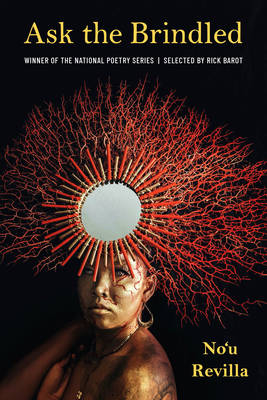
Je cadeautjes zeker op tijd in huis hebben voor de feestdagen? Kom langs in onze winkels en vind het perfecte geschenk!
- Afhalen na 1 uur in een winkel met voorraad
- Gratis thuislevering in België vanaf € 30
- Ruim aanbod met 7 miljoen producten
Je cadeautjes zeker op tijd in huis hebben voor de feestdagen? Kom langs in onze winkels en vind het perfecte geschenk!
- Afhalen na 1 uur in een winkel met voorraad
- Gratis thuislevering in België vanaf € 30
- Ruim aanbod met 7 miljoen producten
Zoeken
Omschrijving
Ask the Brindled, selected by Rick Barot as a winner of the 2021 National Poetry Series, bares everything that breaks between "seed" and "summit" of a life-the body, a people, their language. It is an intergenerational reclamation of the narratives foisted upon Indigenous and queer Hawaiians--and it does not let readers look away.In this debut collection, No'u Revilla crafts a lyric landscape brimming with shed skin, water, mo'o, ma'i. She grips language like a fistful of wet guts and inks the page red--for desire, for love, for generations of blood spilled by colonizers. She hides knives in her hair "the way my grandmother--not god-- / the way my grandmother intended," and we heed; before her, "we stunned insects dangle." Wedding the history of the Kingdom of Hawaiʻi with contemporary experiences of queer love and queer grief, Revilla writes toward sovereignty: linguistic, erotic, civic. Through the medium of formal dynamism and the material of ʻŌiwi culture and mythos, this living decolonial text both condemns and creates.
Ask the Brindled is a song from the shattered throat that refuses to be silenced. It is a testament to queer Indigenous women who carry baskets of names and stories, "still sacred." It is a vow to those yet to come: "the ea of enough is our daughters / our daughters need to believe they are enough."
Ask the Brindled is a song from the shattered throat that refuses to be silenced. It is a testament to queer Indigenous women who carry baskets of names and stories, "still sacred." It is a vow to those yet to come: "the ea of enough is our daughters / our daughters need to believe they are enough."
Specificaties
Betrokkenen
- Auteur(s):
- Uitgeverij:
Inhoud
- Aantal bladzijden:
- 104
- Taal:
- Engels
- Reeks:
Eigenschappen
- Productcode (EAN):
- 9781639550005
- Verschijningsdatum:
- 9/08/2022
- Uitvoering:
- Paperback
- Formaat:
- Trade paperback (VS)
- Afmetingen:
- 150 mm x 226 mm
- Gewicht:
- 181 g

Alleen bij Standaard Boekhandel
+ 44 punten op je klantenkaart van Standaard Boekhandel
Beoordelingen
We publiceren alleen reviews die voldoen aan de voorwaarden voor reviews. Bekijk onze voorwaarden voor reviews.









